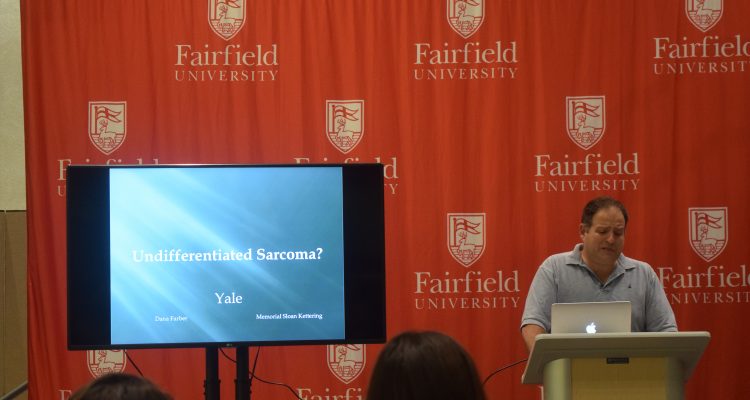In order to raise awareness about and bring attention to the inherently tough reality regarding childhood cancer, students part of the Fairfield chapter of the St. Baldrick’s Foundation hosted an event in the Barone Campus Center on Thursday, Oct. 18. The talk was given by one of the board members of the organization, Will Gerber, who had the chance to speak to students about his experience with childhood cancer concerning his son, Teddy, and his diagnosis and subsequent death from an undifferentiated sarcoma diagnosis.
During the event, Gerber first discussed the feelings Teddy had around two months before being formally diagnosed with leukemia by noting, “We noticed he was acting a little depressed, so we went and talked to his teachers and thought maybe someone was bullying him. We went to the doctor’s a few times and there was nothing wrong with him, then all of a sudden he got really sick and he ended up in Yale New Haven [hospital].” They performed a scan at the hospital and found a large mass on his heart and lungs, which led them to conclude that Teddy had gotten a rare form of cancer known as undifferentiated sarcoma.
One of the key points of his talk was that pediatric cancer does not get the same attention as cancer treatment in adults in the sense that “they [doctors and hospitals] tend to borrow drugs that they use on adults because of the markets … for pediatrics it’s a small market.” He further alluded that the forms of cancer experienced by adults are often based on the environment around them, as well as what they eat and the stress that they are under. Gerber explained that “pediatric cancers tend to be more spontaneous” in that they are not necessarily caused by the environment, but more so as a result of genetics and mutations in that regard.
Teddy underwent a massive surgery for his heart and lungs and Gerber felt as though he was doing very well, but he further said that “the problem is that with sarcoma, if you leave one cell behind, there’s no drug that they can give you that’s going to kill that cell before it multiplies.” In Teddy’s case, the cell was left behind and he relapsed as a result.
However, before Teddy’s death, St. Baldrick’s hosted a charity fundraising event which saw friends of his shave their heads in order to show their sympathy with his chemotherapy causing hair loss. Gerber pointed to the fact that it made Teddy feel normal for once, knowing that everyone else had shaved their heads as well. Now, every year, St. Baldrick’s has an event called “Brave the Shave,” which sees people come out to remember and celebrate Teddy’s life by volunteering to shave their heads to act in solidarity with those who have suffered with cancer patients.
One of the co-presidents of the Fairfield chapter of the organization, Brendan Hunt ‘18, said, “In my opinion, the St. Baldrick’s Foundation is most notably known for its head shaving events.”
In speaking about these events, “Often, head shaving events are organized by individuals or groups and people register and raise money personally to shave their heads. This is effective for the foundation because people are raising money for the foundation, while standing in solidarity with cancer patients who don’t choose to lose their hair.”
One of the students who attended the event, Aidan Danaher ‘20, added, “I thought it was a really interesting and informative event. St. Baldrick’s is a great organization and I’m glad that they have a branch here at Fairfield University. Bringing in an outside speaker to enlighten the students was definitely a great insight into the world and how cancer affects everybody differently.”
Gerber mentioned this in his talk, but Hunt further alluded on a recent breakthrough in the research of leukemia that involved “removing a child’s T cells, re-engineering their structure in a lab to attack leukemia cells and re-infusing them back into the child. Kids who would have otherwise passed away are now going into complete remission thanks to this.”
In regards to the general purpose of the St. Baldrick’s Foundation as a whole, Hunt further explained that “the St. Baldrick’s Foundation is the world’s largest volunteer-powered organization for childhood cancer research. Worldwide, a child is diagnosed with a type of cancer every two minutes, resulting in more children being lost to cancer in the U.S. than any other disease combined.”
Hunt said, “the St. Baldrick’s Foundation exists to change the realities of a childhood cancer diagnosis and works closely with pediatric oncology to determine the most promising research to fund and to make the greatest impact for cancer patients.”


Leave a Reply